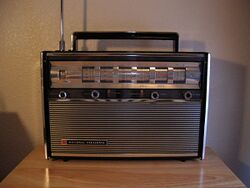Difference between revisions of "Radio"
Jump to navigation
Jump to search
(some more) |
(internal link) |
||
| Line 7: | Line 7: | ||
==War of the Worlds - 1938== | ==War of the Worlds - 1938== | ||
| − | [[Mack White]] is of the opinion that Orson Welles radio adaptation of War of the Worlds in 1938 was a [[psychological warfare]] experiment:<ref>http://mackwhite.com/tv.html saved at [http://web.archive.org/web/20130901231110/http://www.mackwhite.com/tv.html Archive.org] saved at [http://archive.is/yZns1 Archive.is]</ref> | + | [[Mack White]] is of the opinion that [[Orson Welles]] radio adaptation of War of the Worlds in 1938 was a [[psychological warfare]] experiment:<ref>http://mackwhite.com/tv.html saved at [http://web.archive.org/web/20130901231110/http://www.mackwhite.com/tv.html Archive.org] saved at [http://archive.is/yZns1 Archive.is]</ref> |
"[...] an estimated one million people believed the world was actually under attack by Martians. Of that number, thousands succumbed to outright panic, not waiting to hear Welles' explanation at the end of the program that it had all been a Halloween prank, but fleeing into the night to escape the alien invaders.<br><br>Later, psychologist Hadley Cantril conducted a study of the effects of the broadcast and published his findings in a book, The Invasion from Mars: A Study in the Psychology of Panic. This study explored the power of broadcast media, particularly as it relates to the '''suggestibility of human beings under the influence of fear'''." | "[...] an estimated one million people believed the world was actually under attack by Martians. Of that number, thousands succumbed to outright panic, not waiting to hear Welles' explanation at the end of the program that it had all been a Halloween prank, but fleeing into the night to escape the alien invaders.<br><br>Later, psychologist Hadley Cantril conducted a study of the effects of the broadcast and published his findings in a book, The Invasion from Mars: A Study in the Psychology of Panic. This study explored the power of broadcast media, particularly as it relates to the '''suggestibility of human beings under the influence of fear'''." | ||
{{SMWDocs}} | {{SMWDocs}} | ||
| + | |||
==References== | ==References== | ||
{{reflist}} | {{reflist}} | ||
{{Stub}} | {{Stub}} | ||
Revision as of 23:45, 3 August 2020
(Communications technology) | |
|---|---|
 | |
Radio is the technology of signaling and communicating using radio waves. This article is concerned with radio broadcasting as a means of transmission of audio to radio receivers belonging to a public audience.
War of the Worlds - 1938
Mack White is of the opinion that Orson Welles radio adaptation of War of the Worlds in 1938 was a psychological warfare experiment:[1]
"[...] an estimated one million people believed the world was actually under attack by Martians. Of that number, thousands succumbed to outright panic, not waiting to hear Welles' explanation at the end of the program that it had all been a Halloween prank, but fleeing into the night to escape the alien invaders.
Later, psychologist Hadley Cantril conducted a study of the effects of the broadcast and published his findings in a book, The Invasion from Mars: A Study in the Psychology of Panic. This study explored the power of broadcast media, particularly as it relates to the suggestibility of human beings under the influence of fear."
Examples
| Page name | Description |
|---|---|
| BBC/Radio 4 | |
| Radio Sawa | Part of the overt US propaganda apparatus. |
| Talkradio | National talk radio and TV station in the United Kingdom owned by Rupert Murdoch's News Corp. |
Related Document
| Title | Type | Publication date | Author(s) | Description |
|---|---|---|---|---|
| File:Hadley Cantril-The Invasion from Mars.pdf | article | Hadley Cantril |
Many thanks to our Patrons who cover ~2/3 of our hosting bill. Please join them if you can.
References
- ↑ http://mackwhite.com/tv.html saved at Archive.org saved at Archive.is